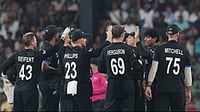The Marylebone Cricket Club (MCC) has stepped in to shed light on the controversial ruling of Mitchell Starc's catch of England batter Ben Duckett on Day 4 of the 2nd Ashes Test at Lord's on Friday.
In the final session, Starc, fielding at deep fine leg, ran a few yards to take a catch after Duckett edged it off a Cameron Green delivery. However, replays showed that the Australian scraped the ball across the ground shortly after.
As a result, it was ruled by the third umpire, Marais Erasmus, that Starc was not in control of his movement resulting in him brushing the ball against the turf. Duckett, thus, was given not out.
Law 33.3 of MCC's Laws of Cricket states that "the act of making a catch shall start from the time from when the ball first comes into contact with a fielder's person and shall end when a fielder obtains complete control over both the ball and his/her own movement."
The MCC re-affirmed the rule on its Twitter platform:
"Law 33 clearly states that a catch is only completed when the fielder has 'complete control over the ball and his/her movement."
In a further explanation, it wrote, "The ball cannot touch the ground before then. In this particular incident, Mitchell Starc was still sliding as the ball rubbed the ground, therefore he was not in control of his movement."
The law has already come into action in the ongoing Ashes Test series a couple of times as well as in the ICC World Test Championship final between Australia and India last month.
Starc and Australia captain Pat Cummins were instrumental in removing England's top order in their run chase in the fourth innings, but opposition captain Ben Stokes and Duckett formed a hard-earned half-century stand to make the play more interesting on the last day on Sunday.





















